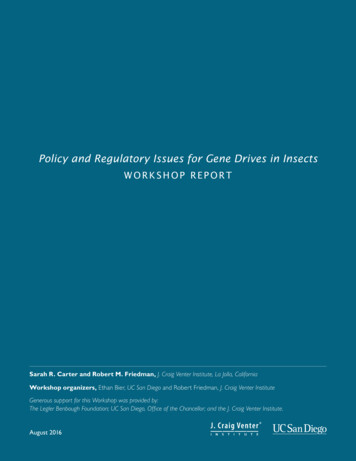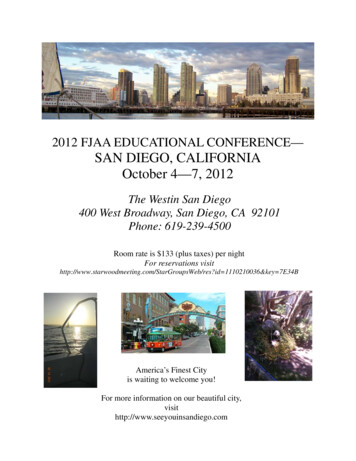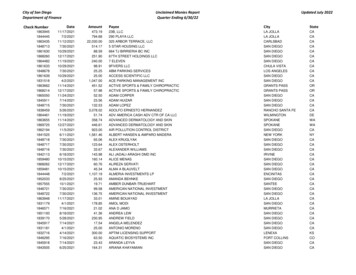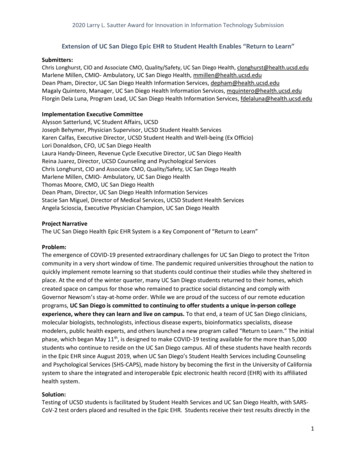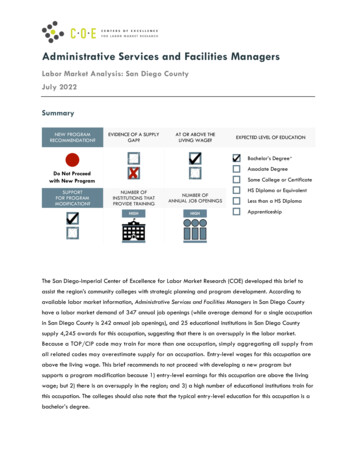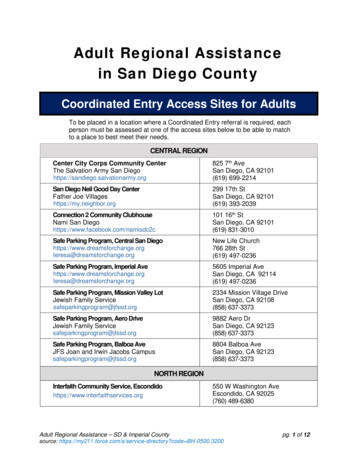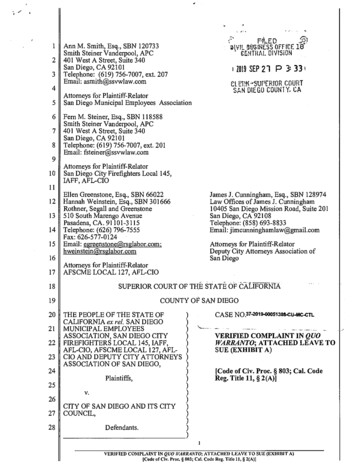
Transcription
2010Annual ReportOffice of the San Diego CityAttorneyCThe Office of the San Diego City Attorney is among theregion's largest law firms, handling a diverse case load.The City Attorney's Office advises the Mayor, the CityCouncil and all its departments keeping the City out ofnew trouble as we deal with the multitude of pastmistakes. The City Attorney’s Office prosecutes ordefends law suits or cases to which the City may be aparty and receives approximately 35,000 criminal casesper year involving persons charged with violations ofthe state laws occurring within the city limits of theCity of San Diego for misdemeanor offenses.Office of the San Diego City Attorney1200 Third Avenue, Suite 1620San Diego, CA 92101619*236*6220
Office of the San Diego City AttorneyTable of ContentsI.CIVIL LITIGATION DIVISION:GENERAL LITIGATION UNIT 3SPECIAL LITIGATION UNIT .5CIVIL PROSECUTION UNIT 10LAND USE LITIGATION UNIT 11WORKERS’ COMPENSATION UNIT .15II.CIVIL ADVISORY DIVISION:PUBLIC SAFETY, LABOR, EMPLOYMENT, SPECIAL PROJECTS & TRAINING SECTION.16PUBLIC WORKS UNIT .23GOVERNMENT AFFAIRS SECTION .25PUBLIC FINANCE SECURITIES & DISCLOSURE SECTION .27REAL PROPERTY & ECONOMIC DEVELOPMENT SECTION .28III.CRIMINAL DIVISION:CASE ISSUANCE UNIT .32GENERAL TRIAL UNIT .38DOMESTIC VIOLENCE UNIT .42APPELLATE UNIT .45IV.COMMUNITY JUSTICE DIVISION:CONSUMER & ENVIRONMENTAL PROTECTION UNIT .47CODE ENFORCEMENT UNIT .53NEIGHBORHOOD PROSECUTION UNIT 622
Office of the San Diego City AttorneyThe Department's mission statement is:Integrity matters! We can best help our city by maintaining our integrity, providing timely,accurate and high quality legal representation to the City of San Diego. We will be firm,independent and professional, stopping illegalities while suggesting solutions. We will neverforget that we are accountable to the people of San Diego and that we represent the City of SanDiego.City Attorney Jan Goldsmith has been an attorney since1976 specializing in business litigation. He was appointed SanDiego Superior Court Judge in 1998 and retired in December of2008 to assume the office of San Diego City Attorney. Mr.Goldsmith spent his first 6 years on the Bench handling criminaland civil trials and his final years assigned to an independent civilcalendar.The Office of the San Diego City Attorney has restructured itself into a private law firmmodel with four divisions: Civil Litigation, Civil Advisory, Criminal, and Community Justice. Thesedivisions are subdivided into sections and units which allow the attorneys to specialize in areasof practice. http://www.sandiego.gov/cityattorney/Civil Litigation: The Civil Litigation Division prosecutes or defends civil lawsuitsin which the City is a party. The Civil Litigation Division is divided into five units: CivilProsecution, Workers’ Compensation, Land Use Litigation, General Litigation and SpecialLitigation. Don Worley, the Assistant City Attorney heading this division, has over 30years in private practice in land use, real estate, and business litigation.GENERAL LITIGATION UNITThe San Diego City Attorney’s General Litigation Unit consists of Chief Deputy City AttorneyDonald F. Shanahan, Deputy City Attorneys Jane Boardman, Bonny Hsu, Keith Phillips, JenniferGilman, Catherine Turner, John Riley, Stacy Plotkin-Wolff, and Brian Murphy. Each attorneyhandles a heavy case load, defending the City of San Diego, agencies within the City, and itsagents. The types of cases handled by the General Litigation Unit include, but are not limited to,police excessive force cases, state common law torts, constitutional issues, dangerous conditioncases, motor vehicle accidents, and an assortment of other tort and personal injury cases. Theattorneys in the General Litigation Unit were highly successful in resolving a variety of lawsuitsfavorable to the City. Numerous summary judgment motions, motions to dismiss, anddemurrers were obtained for our City clients.During the past year, the General Litigation Unit received 101 new cases, in addition to thecarry-over of cases from 2009. Eighty-nine (89) cases were disposed of through trials, motionpractice, tender letters, and settlement negotiations. In addition to resolving cases whichmonetarily benefit the City, the General Litigation Unit obtained legally significant rulings.3
Office of the San Diego City AttorneySeveral examples include:McGowan v. City of San Diego: This matter was taken to trial and City defendants prevailed.The case arose out of the robbery and beating by Plaintiff McGowan of a man at his ownapartment. McGowan then stole the victim’s car. The victim reported the incident, and K-9officer Leach learned of it over his police radio and proceeded to the area where the robberyoccurred. He had heard that McGowan had threatened to shoot the robbery victim. OfficerLeach located the stolen vehicle and followed it into a gas station. After identifying the vehicleand noting that McGowan matched the description of the robber, he exited his vehicle with hisdog and approached McGowan, who he believed was armed. Officer Leach ordered McGowanout of his vehicle and told him to lie on the ground. McGowan reached into the waistband ofhis pants several times, and Officer Leach believed he was reaching for a gun. McGowan wasuncooperative and kept yelling obscenities. Officer Leach warned McGowan that he woulddeploy the dog if McGowan did not do as he was told. When he refused to put his handsbehind his back, started getting up off the ground, and reached into his waistband for the thirdtime, Officer Leach deployed his dog. The dog bit McGowan on the head and held the bitewhile McGowan fought with the dog. After other officers arrived and had McGowan undercontrol, Officer Leach released the dog. McGowan is now serving a 31-year sentence for thecrime which precipitated this case, but he insisted on pursuing it to trial.Ocie Henderson, et al. v. City of San Diego: This case stems from an in-custody death case ofRamel Henderson on May 30, 2007. Ocie Henderson, the decedent’s father, representing theEstate, and decedent’s children, Ramel Henderson, Jr., Jennelle Henderson and DonteHenderson sued four San Diego Police Officers, San Diego Police Chief William Lansdowne andthe City of San Diego for money damages. The complaint set forth five causes of action,including excessive force in violation of the Fourth and Fourteenth Amendments; a Monellclaim against Defendants Lansdowne and the City for failure to instruct, train, and supervise;wrongful death, survival action, and negligence. Defendants moved for summary judgment onthe basis that the force used to subdue a violent suspect was reasonable under thecircumstances and, as a consequence, did not violate the Fourth Amendment standards offorce. Moreover, regardless of whether or not a constitutional violation occurred, the right inquestion was not clearly established in the Ninth Circuit at the time and, therefore, a finding ofqualified immunity on behalf of the Defendant officers was required. On February 16, 2010,the Court granted Defendants’ motion for summary judgment in its entirety.Michael Stewart v. City of San Diego, Pam Rowlett, et al.: Plaintiff Michael Stewart, filed aforty page complaint consisting of arguably six causes of action. The first cause of action claimsthat on February 23, 2009, a police officer cut in front of Plaintiff in her patrol car causing himto lose control of his vehicle and crash into a light post. The second cause of action claims thatthe fifteen other named officers’ realized that Plaintiff had no memory of the accident andhelped cover up the police officers’ alleged illegal actions on February 23, 2009, by submittingfalse reports, committing conspiracy. The third, fourth, and fifth causes of action allege that onJune 14, 2008, at about 10:45 a.m. the police officer harassed him and conducted an unlawfulsearch of himself and his car. Plaintiff further claims that the police officer harassed him andsearched his car on two previous unidentified occasions. Finally, Plaintiff’s sixth cause of action4
Office of the San Diego City Attorneyclaims that a former deputy city attorney and city attorney investigator were part of a doubleconspiracy, trying to cover up the details of the February 23, 2009, accident, providing falseinformation, and withholding relevant information. On December 6, 2010, the City’s Motion forSummary Judgment was granted.Wilson v. City of San Diego, et al.: Sergeant Ken Davis arrested Plaintiff, Melford Wilson, onFebruary 16, 2007 for P.C.§148(a)(1) resisting, obstructing or delaying a peace officer in theperformance of his duties. In the lawsuit filed in federal court against Sgt. Davis, the City, ChiefLansdowne and SDPD, the Plaintiff asserted the following legal claims arising from theaforementioned arrest: 1) false arrest, 2) excessive force, 3) retaliation, 4) false imprisonment,5) malicious prosecution, 6) failure to properly screen and hire, 7) failure to properly train 8)failure to properly supervise and discipline, and 9) Monell violation. Defendants filed a Motionfor Summary Judgment on all causes of action. At oral argument, Plaintiff’s attorney advised theCourt that he would dismiss the excessive force, failure to properly screen and hire, failure toproperly train, failure to properly supervise and discipline and Monell violation causes of action.That left causes of action for false arrest, retaliation, false imprisonment and maliciousprosecution against Sgt. Davis only. The Court granted summary judgment to the remainingcauses of action in the matter, thereby dismissing the case in its entirety.Longhenry v. City of San Diego: Plaintiff was involved in a single car rollover accident whiledriving from La Jolla Scenic to La Jolla Parkway. Plaintiff alleged a dangerous condition of publicproperty because there was substantial water running across the street from an unknownsource. City prevailed on motion for summary judgment. The Court found City was immunefrom liability based on Government Code sections 818.4 (for issuing a permit) and 818.6 (forinadequate or negligent inspection). The Court also found City did not have actual orconstructive notice of the condition.SPECIAL LITIGATION UNITUnder the direction of Chief Deputy City Attorney Joe Cordileone, the Special Litigation Unitdefends the City of San Diego, its employees, officials and departments in civil actions that arenot considered “General Litigation” matters. The following are examples of the type of workperformed by the Special Litigation Unit: Defend the City in class action lawsuits. Defend challenges to the constitutionality of City ordinances and City policies or practices. Defend employment-related cases which include claims of discrimination, harassment,retaliation and FLSA wage and hour matters.5
Office of the San Diego City Attorney Defend the City in complex litigation — whenever any lawsuit against the City, by virtue of itssize or level of difficulty requires extra attention from the court, it is declared “complex,” andits defense is transferred to the Special Litigation Unit. Represent various City departments in administrative hearings before the Civil ServiceCommission and CalOSHA. Prosecute and defend all appeals in State and Federal Courts. Defend writs or other non-standard legal challenges, including employment-relatedadministrative writs, alleged Brown Act and Public Records Act violations, election challenges,and actions involving provisions in the City Charter and Municipal Code.Employment Cases:The City was successful in defense of various employment matters. Often the cases allegediscrimination in one form or another as the basis for adverse employment actions includingdiscipline, failure to promote and termination. In most instances, our deputies satisfied eitherstate or federal trial judges that the cases were so lacking in merit that a trial was unnecessaryresulting in many frivolous lawsuits being dismissed by the Court without the need for trial.Case Examples:Linares v. City of San Diego:Wrongful termination and retaliation suit.City’s Motion for Summary Judgment was granted thereby ending the case.Osborn v. City of San Diego:Writ seeking to overturn Civil Service Commission’s decision to impose an unpaid 15-monthsuspension on pugilistic employee.Court denied injunction thereby ending the case.Rickie Reynolds v. City of San Diego:“Whistleblower” lawsuit against the City.City’s Motion for Summary Judgment was granted thereby ending the case.Wiggins v. City of San Diego:City’s Motion for Summary Judgment was granted thereby ending the case.Civil Service Commission cases:Appeal of Michael Gaines:Termination upheld.Appeal of Robert O’Rourke:6
Office of the San Diego City AttorneySuspension upheld.Appeal of Jaime Rodriguez:Termination upheld.Appeal of Robert Ruge:Termination upheld.Appeal of Alfredo Ruiz:Suspension upheld.Other High Profile Employment Related Cases:Blizzard v. SDCERS, et al.:A former City paramedic, worked a 56 hour work week. He sought to increase his pension bycounting hours in excess of 40 as overtime for “highest annual salary” purposes. The Cityprevailed at trial.City of San Diego v. Means:City sued a former Deputy Director for inappropriately awarding contracts without properoversight. City prevailed at trial.City of San Diego v. SDCERS:City sued to prevent SDCERS from charging the City for the underfunding of the pension systemcaused by SDCERS selling service credits at a non cost neutral price. The City prevailed at trial.The judgment was affirmed on appeal in a published decision.Collins v. City of San Diego:Three former Police Officers’ Association presidents sought to increase their pension benefitsby using a combination of their highest City and union salaries as their highest salary forpension purposes. City prevailed on demurrer.McGuigan v. City of San Diego:After a class action was settled, one union opposed the settlement. City and settling employeesprevailed on appeal. Then the settling employees tried to sue the City to require it to pay theirattorney fees for fighting the appeal seeking approximately 700,000. The Court of Appealaffirmed the trial court’s decision in a published opinion.San Diego City Employees’ Retirement System v. City of San Diego:SDCERS was sued the City for an additional contribution of 178,000,000 to the pension plan.Court granted City’s judgment in the City’s favor based solely on SDCERs’ pleadings.San Diego City Firefighters, et al v. City of San Diego, et al.:7
Office of the San Diego City AttorneyFirefighters Union president sought to increase his pension benefit by combining his highestCity and union salary as his highest salary for pension purposes. Also, several more firefighterssued the City to remove a program called the “cashless leave conversion” program. Cityprevailed on demurrer.Outside the Employment Arena the Special Litigation Section Has Been Busy with Cases Suchas:Bush v. City of San Diego:Organizer of “San Diego Naked Bicycle Ride” unsuccessfully sought to enjoin the City fromenforcing its public nudity ban. Court denied the injunction thereby ending the case against theCity.Cornerstone Sec. Prof’ls, Inc. v. Visco Entertainment Group, Inc., et al.:Plaintiff alleged a former police officer in his official capacity, made false representations tonightclubs and thereby interfered with its business. Plaintiff dismissed the City from itscomplaint based upon legal issues City presented.Douglas Barnhart, Inc. v. City of San Diego:Petition for writ arising from civil penalty over discharge of sediment. Injunction deniedthereby ending the case.Fumagalli v City of San Diego:Election case alleging improprieties in the balloting for school board officials. Injunction deniedthereby ending the case.Guy v. City of San Diego:On appeal the Plaintiff sought a retrial on damages following a jury award of 1.00 for excessiveforce by a police officer during an arrest. Court of appeal affirmed the award.Johnson, et al. v. People of State of California, et al.:Petition for a writ over hearing officer’s assessment of costs for code violations. Injunctiondenied thereby ending the case.J.T. Wimsatt Contracting Co. v. City of San Diego:Concrete subcontractor sought to halt construction on New Central Library project.Injunction denied thereby ending the case.Keys v. City of San Diego:Writ to overturn administrative ruling in favor of City upholding noise ordinance violations.Injunction denied thereby ending the case.Lorkovic v. City of San Diego:8
Office of the San Diego City AttorneyWrite challenged City’s ability to disallow personal auto repair in a residential zone.Injunction denied thereby ending the case.O’Sullivan v. City of San Diego, and La Jolla Friends of the Seals, et al. v. NOAA, et. al. and AnimalProtection & Rescue League, et al. v. Mayor Jerry Sanders:Three different cases and appeals against the City to enjoin various actions related to thepresence of seals at the Children’s Pool in La Jolla. All ended successfully and appeals eitherdropped or City prevailed on them.Royster v. City of San Diego:Petition challenging fine imposed by the City for residential code violations.Injunction denied thereby ending the case.Runaj v. City of San Diego:Writ challenging an Administrative Hearing Officer’s order imposing penalties and costs of 82,507.54. Court granted the City’s demurrer thereby ending the case.Ryder v. City of San DiegoElection case alleging improprieties in ballot measure. Injunction denied thereby ending thecase.Salas v. City of San Diego:Writ claiming City abused its discretion in fining him for residential code violations. Petitiondenied thereby ending the case.Siempre Viva Business Park West, LLC, et al. v. City of San Diego:Writ alleging numerous violations. After City prevailed on a series of motions petitioners agreedto drop their claims.Southwest Center for Biological Diversity v. Bartel, et al.:In 2006, the District Court enjoined all private and public development projects on sites wherevernal pools are present due to Endangered Species Act. The injunction against the City wasvacated on appeal.Swift Frame v. City of San Diego:Class action complaint seeking a refund of all business tax processing fees paid from 2004-2009.Court sustained City’s demurrer without leave to amendThorp v. City of San Diego:Writ challenging ruling of City’s code compliance. Petition denied thereby ending the case andlater the City was awarded costs for petitioner having filed a frivolous appeal.Towers v. City of San Diego:9
Office of the San Diego City AttorneyTowing companies’ sought preliminary injunction seeking to prevent the City from enteringnew towing contracts inside the City limits. Injunction denied.Trunk and Paulson v. City of San Diego:Plaintiffs sought removal of the Mt. Soledad cross after Congress passed a law taking theproperty from the City. After the Court dismissed the City from the lawsuit, the City successfullynegotiated a just compensation amount.United Auto Workers (UAW) v. City of San Diego and Convention Center:Injunction brought against City concerning delivery of petitions. City attorneys persuadedPlaintiff to dismiss City from case without filing papers.Watkins v. Jerry Sanders, et al.:Suit in federal court alleging deficiencies in permit requirements for businesses offering kayaktours. City’s motion to dismiss granted thereby ending the case.CIVIL PROSECUTION UNITThe Civil Prosecution Unit (CPU) collects money owed to the city by initiating litigation orsupervising litigation initiated by outside contingency counsel on behalf of the city. ChiefDeputy Dan Bamberg supervises the six-deputy unit.In 2010, the CPU was responsible for bringing in over 4,000,000 from collection actions,litigation initiated by the City, and from other actions litigated by outside counsel as directed byone or more of the CPU’s deputies.Among the CPU’s successes this year were Deputy City Attorney Clay Welch’s 2,000,000settlement with Service America, dba Centerplate, the entity that provides concession servicesat Qualcomm stadium; Chief Deputy City Attorney Dan Bamberg’s 235,000 settlement of adispute with the Fairbanks Ranch Country Club concerning its lease, and the 89,000 DCABamberg obtained in a case involving accounting irregularities at Promote La Jolla, Inc.Deputy City Attorney Tessa Heunis with the Revenue and Recovery section of the CivilProsecution Unit handled dozens of cases this year, bringing in tens of thousands of dollars oncases involving, among other things, failure to pay penalties imposed for neighborhood codecompliance violations, failure to pay water bills, and failure to pay rent.Deputy City Attorney Bruce Bailey continues to pursue SDG&E and Cox Cable for damagesarising out of the 2007 wildfires that devastated the city. He has the matter scheduled formediation in mid-March 2011.Deputy City Attorney Molly Hoot obtained dismissals on three occasions against a law firm thathas made a cottage industry out of suing the city. A class action initiated by the ACLU allegingthat the city was unconstitutionally destroying the personal possessions of the homeless whenabating nuisances, the CPU’s Chief DCA Bamberg was able to negotiate a unique settlement.10
Office of the San Diego City AttorneyThat settlement resulted in a city owned warehouse being utilized as a place for the homelessto store their property rather than pushing it around in a shopping cart. The warehouse will beoperated by one of the named plaintiffs in the case (The Isaiah Project, Inc.) utilizing thesettlement proceeds. The settlement should lead to less blight on the streets of downtown inaddition to providing a service to the city’s homeless.While pursuing tens of millions in damages against Kinder Morgan for polluting the city’s waterand land under Qualcomm stadium, Deputy City Attorney Jon Taylor also made significantstrides in recovering Transit Occupancy Taxes this year. Most notable was DCA Taylor’soversight of outside counsel in obtaining a 21,000,000 award by an administrative hearingofficer against the nation’s top Online Travel Companies. The case is now on appeal.LAND USE LITIGATION UNITThe Land Use Litigation Unit (LULU) prosecutes and defends all real property, land use,development and environmental actions on behalf of the City of San Diego. Chief DeputyChristine Leone supervises the six deputy unit.LULU provides specialized knowledge and representation of the City in the following types oflitigation:Prosecutes and defends legal actions involving the California Environmental QualityAct (CEQA), state and federal eminent domain actions, and constitutional issuesrelated to the use of land, real estate valuation and real estate development.Prosecutes and defends actions relating to administrative decisions by the Cityinvolving the subdivision map act, zoning, permitting and other administrativeprocedures.Defends and initiates land use cases, including writs of mandamus and prohibition,CEQA writs, and property damage claims arising from floods, sewer backups, soilsubsidence, etc.Advises City Council and City Departments relating to potential litigation andsettlement of claims involving land use maters.These specialized skills are important to the City in that land use cases typically have enormouspolitical and economic implications for the City. Without attorneys capable of navigatingthrough the issues unique to these cases, the City could be liable for significant damages andattorneys’ fee claims and lose its ability to regulate the use of its land.Last year the Land Use Litigation Unit handled 90 cases as well as advising various CityDepartments on potential litigation matters.CURRENT MAJOR CASES/PROJECTS:11
Office of the San Diego City AttorneyAcademy of Our Lady of Peace v. City of San Diego casesPetitioner alleges that City imposed a substantial burden on its religious activities under theReligious Land Use and Institutionalized Persons Act by denying the right to demolish certainhistorical buildings on its property for its school expansion.City of San Diego v. Sweetwater AuthorityCity sued to prevent the expansion of a desalination project because the project will violateCity’s water rights and, under CEQA, because Sweetwater did not adequately analyze andmitigate significant impacts.CERF v. City of San Diego (fireworks case)This case involves a challenge to the City’s permitting requirements related to the permitting ofa firework show on the 4th of July, 2010 at the La Jolla Cove. Petitioner argues the process isdiscretionary and required, but did not receive CEQA review.FreePB.org v. City of San DiegoPetitioner challenges City’s process and procedure for processing park permits and specialevents stating that these actions require a certain type of environmental review.Flood CasesVarious environmental groups have filed numerous lawsuits alleging CEQA violations inconnection with the City’s storm channel clearing and flood control work.Fox v. Redevelopment Agency, CCDC and City of San DiegoPlaintiffs representing various housing advocates filed an action challenging City, Agency andCCDC involvement in the recent state legislation CRL section 33333.14 which removes the taxincrement cap from the CCDC redevelopment project area.In re Wireless LitigationThis matter involves seven consolidated federal court actions challenging City’s application ofits telecommunication regulations.Related California Urban Housing LLC et al v. City of San DiegoPlaintiffs Related California Urban Housing, LLC, Related/7th & Market Urban Housing LLC, and7th and Market Development LCC filed an action for Breach of Contract and other damagesagainst the City, RDA and other named defendants, claiming Defendants breached an exclusivenegotiating agreement. Plaintiffs claim the breach caused over 3.8 million dollars in damages.12
Office of the San Diego City AttorneyMAJOR CASES/PROJECTS * Completed in FY2010Success in land use litigation matters are significant as most land use cases are subject to anaward of attorneys’ fees. While general civil law parties incur their own fees, cases in the LandUse Litigation Unit (CEQA, mandate, inverse condemnation) allow for a statutory award of feesto a successful Petitioner. Thus, victories are not only important to protect the City’s land use,zoning, planning and development decisions but also to preclude money awards against theCity.Ace Properties v. City of San Diego, SDSC Case No. GIC 872333Plaintiff brought an inverse condemnation action against the City, alleging that City has takenits property for a drainage basin project in Otay Mesa. City Attorney's Office prevailed in athree week trial, saved the City from a multi-million dollar claim, and recovered costs ofapproximately 218,000.Beard v. Bank of America et al.In this case, Plaintiff filed Quiet Title action challenging conditions placed in permit relating toparking structure built by Plaintiff in La Jolla. Plaintiff accepted the City’s 998 Offer toCompromise by which the City offered to waive the City’s costs in exchange for Plaintiff’sdismissal of the City with prejudice.Affordable Housing Coalition of San Diego County v. City of San DiegoPetitioner filed a challenge under CEQA challenging City’s Housing Element of the General Plan.The Court denied the writ of mandate and the case was dismissed.Affordable Housing Coalition of San Diego County v. City of San DiegoPetitioner filed Petition for Writ of Mandate under CEQA and other laws challenging City’stourism assessment district. The lawsuit could have invalided the assessment district andpotentially made other districts more vulnerable to judicial review. Court denied the petitionthereby barring Petitioner from recovering attorneys’ fees. Petitioner appealed the case whichupheld on appeal by the 4th District. City awarded costs at trial and on appeal.Citizens For Equitable Environmental Development v. City of San Diego (CREED 7)This case involved a challenge to the City's approval of a residential development in Otay Mesaunder CEQA. The trial court upheld the City's environmental analysis, holding that there was nonew information or changed circumstances regarding the project's impacts on water supply orclimate change that would require a new environmental impact report to supplement an earlierone prepared for the project in 1994. This case is currently up on appeal.This victory upheld the City’s standard CEQA procedure for analyzing minor project changes andavoided liability for an attorneys’ fee claim of hundreds of thousands of dollars.13
Office of the San Diego City AttorneyCREED v. City of San Diego (Black Mountain Ranch)In this case, Petitioner made a CEQA challenge to City Council’s approval of Black Mountainproject with addendum to Environmental Impact Report. The City prevailed on all claims at triallevel paying no damages or attorneys’ fees.El Cortez HOA v. RDAThis case involved a CEQA challenge to October 28, 2008 decision relating to El Cortez Hotel.City was able to settle for no money or attorneys’ fees and received a dismissal with prejudice.Kensington Park Villas v. City of San DiegoIn this case, the City storm drains deteriorated causing sinkhole on Plaintiff’s property. Plaintiffalleged significant property damaged. City dismissed from action with prejudice. Nosettlement paid.San Diego Navy Broadway Complex Coalition v. City of San Diego, et al.In February, 2007, the San Diego N
City Attorney Jan Goldsmith has been an attorney since 1976 specializing in business litigation. He was appointed San Diego Superior Court Judge in 1998 and retired in December of 2008 to assume the office of San Diego City Attorney. Mr. Goldsmith spent his first 6 years on the Bench handling criminal


